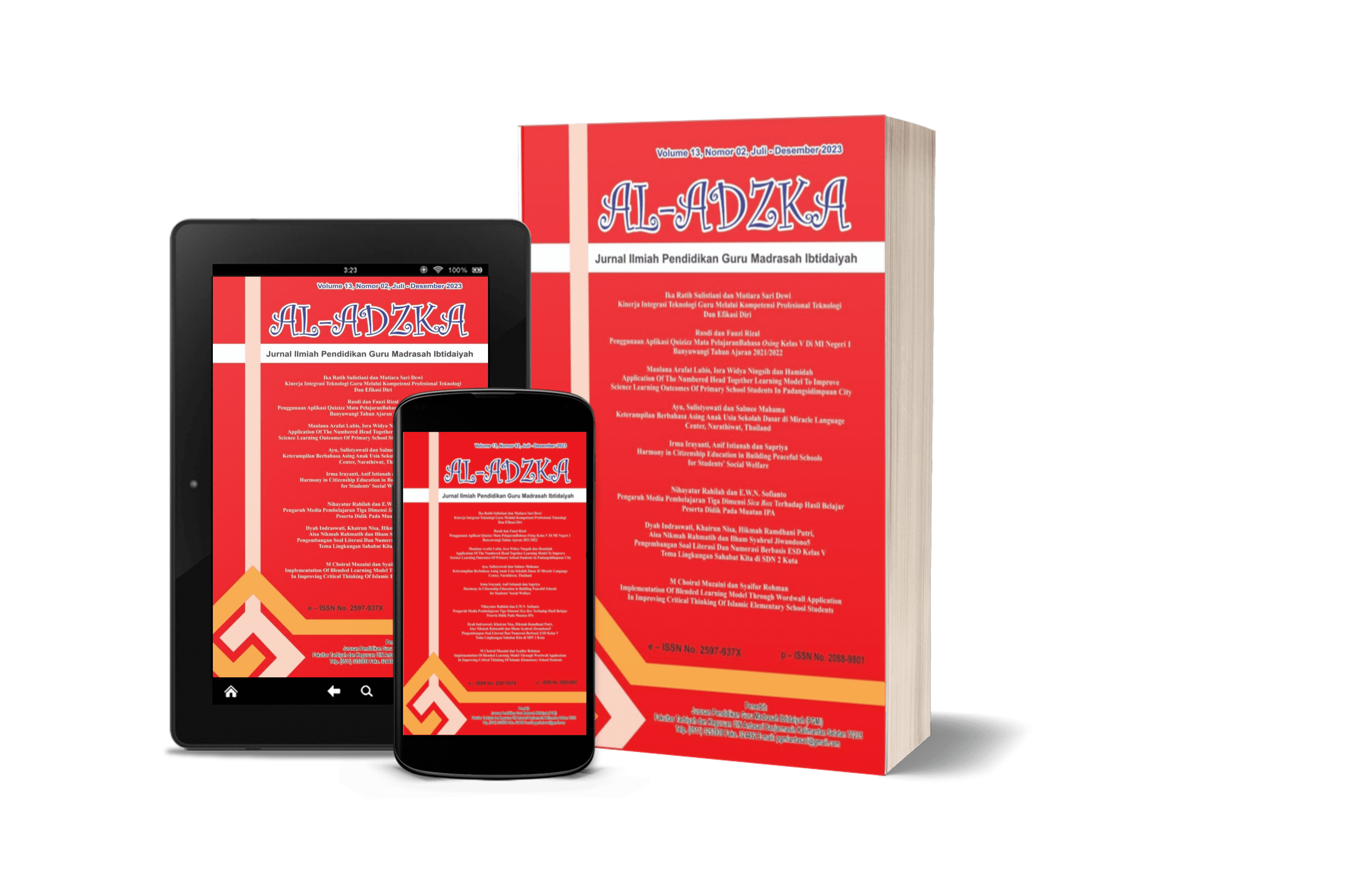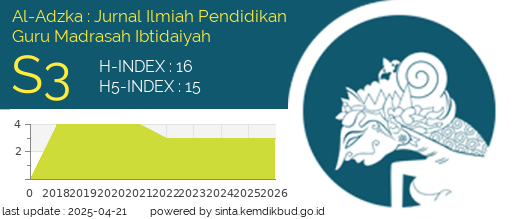Literation Culture Living at MI Qurrota A'yun
DOI:
https://doi.org/10.18592/aladzkapgmi.v12i2.7586Keywords:
living, culture, literacy, basic educationAbstract
This research is intended to find out how the model and implementation of literacy culture and its impact on students' willingness to read in Madrasah Ibtidaiyah. The type of research used in this study is descriptive with data collection techniques namely, observation, in-depth interviews and documentation. The data analysis process uses the Miles and Huberman model, namely data reduction, data analysis and drawing conclusions. The research findings show that: 1) The literacy culture model at MI Qurrota A'yun is carried out in three stages, namely through introduction, development and learning; 2) Implementation of cultural literacy is applied inside and outside the classroom with methods of inquiry, questioning, reading, presenting and debriefing and collaboration; 3) The influence of literacy culture on students' interest in reading is effective. This activity shows that the desire to read already exists, students just need to be equipped and facilitated in order to produce students who are truly educated in their literacy aspects.References
Almarzooq, Z. I., Lopes, M., & Kochar, A. (2020). Virtual Learning During the COVID-19 Pandemic: A Disruptive Technology in Graduate Medical Education. Journal of the American College of Cardiology, 75(20), 2635–2638. https://doi.org/10.1016/j.jacc.2020.04.015
Alparedi, T., & Toni, H. (2021). Pengaruh Gaya Kepemimpinan, Budaya Organisasi, dan Komunikasi Organisasi Terhadap Kepuasan Kerja Serta Dampak Terhadap Kinerja Karyawan Bank Danamon Simpan Pinjam Cluster. J-MAS (Jurnal Manajemen Dan Sains), 6(2), 291. https://doi.org/10.33087/jmas.v6i2.291
Amri, S., & Rochmah, E. (2021). Pengaruh Kemampuan Literasi Membaca Terhadap Prestasi Belajar Siswa Sekolah Dasar. EduHumaniora | Jurnal Pendidikan Dasar Kampus Cibiru, 13(1), 52–58. https://doi.org/10.17509/eh.v13i1.25916
An-Nisa Apriani, dan Y. D. A. (2017). Membangun Budaya Literasi Permulaan Bagi Siswa SD Kelas Awal Melalui Pop Up Book. Http://Repository.Upy.Ac.Id/1792/1/2.%20AN-NISA.Pdf, 4(1), 88–100.
Hasanah, U., & Deiniatur, M. (2019). Membangun Budaya Membaca Pada Anak Usia Dini Di Era Digital. At-Tajdid : Jurnal Pendidikan Dan Pemikiran Islam, 3(01), 10. https://doi.org/10.24127/att.v3i01.973
Hermansyah. (2020). Analisis teori behavioristik (edward thordinke) dan implementasinya dalam pembelajaran sd/mi. 7, 15–25.
Kemendikbud, S. G. L. S. (2018). (p. 11).
Lestari, F. D., Ibrahim, M., Ghufron, S., & Mariati, P. (2021). Pengaruh Budaya Literasi terhadap Hasil Belajar IPA di Sekolah Dasar. Jurnal Basicedu, 5(6), 5087–5099. https://doi.org/10.31004/basicedu.v5i6.1436
Matthew Milles dan Michael Huberman. (2014). Analisis Data Kualitatif, (Buku Sumber Tentang Metode-Metode. Book.
Mullis, I. V. S., & Martin, M. O. (2021). Reading Assessment Framework. PIRLS 2021 Reading Assessment Framework, 5–25.
Novandri, T. Y., Ahmad, S., & Putra, A. Y. (2021). Pengaruh Berpikir Kritis dan Kebiasan Belajar Terhadap Hasil Belajar. Jurnal Educatio, 7(3), 763–768. https://doi.org/10.31949/educatio.v7i3.1219
Palar, M. R. A., Sukarsa, D. E., & Ramli, A. M. (2018). Indonesian system of geographical indications to protect genetic resources, traditional knowledge and traditional cultural expressions. Journal of Intellectual Property Rights, 23(4–5), 174–193.
Presiden, R. I. (2017). Undang-Undang Republik Indonesia Nomor 3 Tahun 2017 Tentang Sistem Perbukuan Bab I Ketentuan Umum Pasal 1.
Ratnawati, E., & Asniawati, A. (2020). Pemberian Motivasi Melalui Cerita Dan Games. Dimasejati, 2(2), 204–213.
Saryono, D., Dkk, Nasional, G. L., Tulis, M. P. L. B., & Kemendikbud, S. T. G. L. N. (2017). No Title (p. 2).
Solihin Dkk. (2019). Indeks Aktivitas Literasi Membaca dari 34 Provinsi. Pusat Penelitian Kebijakan Pendidikan dan Kebudayaan Badan Penelitian dan Pengembangan Kementrian Pendidikan dan Kebudayaan.
Subiyantoro. (2013). Pengembangan Model Pendidikan Nilai Humanis-Religius Berbasis Kultur Madrasah”. In Cakrawala Pendidikan (p. 7).
Sugioyono. (2009). Metode Penelitian Pendidikan, Pendekatan Kualitatif Kuantitatif dan R&D. Alfabeta.
Vivi Indriyani, Zaim, M., Atmazaki, A., & Ramadhan, S. (2019). Literasi Baca Tulis Dan Inovasi Kurikulum Bahasa. KEMBARA: Jurnal Keilmuan Bahasa, Sastra, Dan Pengajarannya, 5(1), 108. https://doi.org/10.22219/kembara.vol5.no1.108-118
Wiedarti. (2018). Direktorat Jenderal Pendidikan Dasar dan Menengah, Desain Induk Gerakan Literasi Sekolah (p. 34).
Wiedarti, D. (2018). Desain Induk Gerakan Literasi Sekolah. Direktorat Jenderal Pendidikan Dasar dan Menengah Kementrian Pendidikan dan Kebudayaan.
Wiedarti, P., & etal. (2018). Desain Induk Gerakan Literasi Sekolah. Direktorat Jenderal Pendidikan Dasar dan Menengah Kementerian Pendidikan dan Kebudayaan.
Winaryati, E. (2018). Penilaian Kompetensi Siswa Abad 21. Seminar Nasional Edusainstek FMIPA UNISMUS 2018, 6(1 ), 6–19.
Wawancara dengan ibu Yayang Nurainingtias, Guru MI Qurrota A’yun Sleman Yogyakarta pada tangga 07 februari 2020.
Wawancara dengan pak Afifuddin, Guru MI Qurrota A’yun Sleman Yogyakarta pada tangga 10 februari 2020
Wawancara dengan Suriandari guru di MI Qurrota A’yun Sleman Yogyakarta pada tangga 06 februari 2020
Downloads
Published
How to Cite
Issue
Section
License
Authors who publish with this journal agree to the following terms:
- Authors retain copyright and grant the journal right of first publication with the work simultaneously licensed under a Creative Commons Attribution 4.0 International that allows others to share the work with an acknowledgement of the work's authorship and initial publication in this journal.
- Authors are able to enter into separate, additional contractual arrangements for the non-exclusive distribution of the journal's published version of the work (e.g., post it to an institutional repository or publish it in a book), with an acknowledgement of its initial publication in this journal.
- Authors are permitted and encouraged to post their work online (e.g., in institutional repositories or on their website) prior to and during the submission process, as it can lead to productive exchanges, as well as earlier and greater citation of published work.












